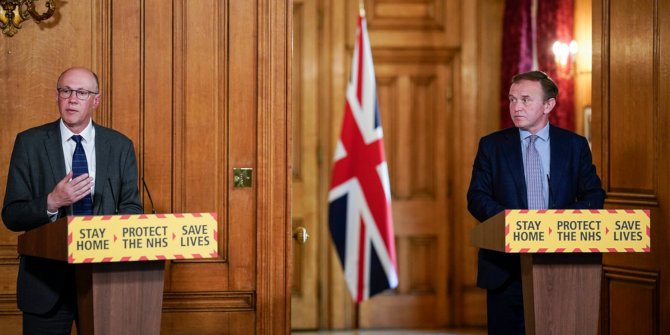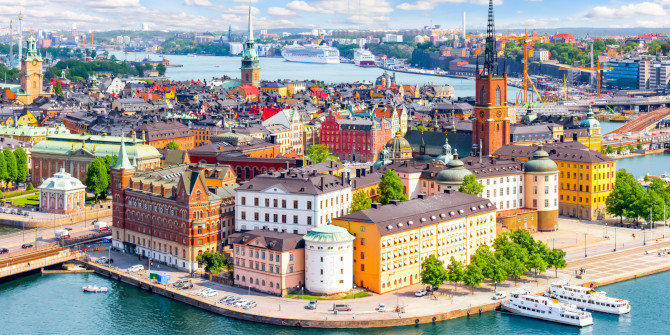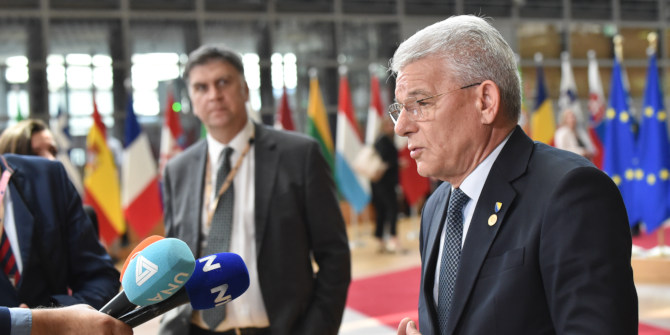The build-up of Russian troops on the Ukrainian border and Russia’s involvement in Kazakhstan have reignited debates about the country’s interventionist role in post-Soviet states. Kevork Oskanian documents how Russia has veered from subversive normative imitation of the West in the aftermath of the Cold War, to open confrontation with the liberal international order.
Russia is restless once again. Over the past 18 months, it has interceded in a conflict between Armenia and Azerbaijan; escalated troop numbers along the Ukrainian border twice, punctuating the still-ongoing second episode with ominous threats towards Kyiv and broader expressions of dissatisfaction with the current Eurasian security regime; and intervened in a sudden outbreak of violent unrest in previously relatively placid, generally pro-Russian – and authoritarian – Kazakhstan.
Why can’t Russia help itself? Debates on Russia’s tendency to assign itself an interventionist role within its ‘near abroad’ are as polarised as ever. On one side, those of a more liberal persuasion point to the authoritarianism of the Kremlin’s current occupants, and claim that this neo-imperial tendency to suppress democracy – especially in linguistically and culturally proximate neighbours like Ukraine and Belarus – emerges out of a malicious need for regime survival: if it weren’t for Putin and his siloviki, all would be well (or better, at least).
On the other hand, realists explain Russia’s revisionism as a perfectly rational reaction to strategic encroachment into a continental great power’s already unstable and dangerous neighbourhood: in the absence of some form of buy-in into the Eurasian security order, NATO expansion and regional conflicts remain Moscow’s main fear, and intervention a to-be-expected response. The tendency to apportion blame mainly on a characteristic inherent to Russia’s regime – in some cases, even Putin himself – contrasts starkly with a more self-critical approach found among Western restrainers, with their ‘third-image’ view of international relations.
Both these perspectives fail to grasp the bigger, longer-term picture helping shape the behaviour of Russia’s elites. In fact, as I argue in a recent monograph, one cannot dissociate Russia’s fraught contemporary relationship with its former imperial subalterns – be it Armenia/Azerbaijan, Ukraine or Kazakhstan – from its tortuous quest for status and recognition in an international society long defined by the West. On the one hand, that West has functioned as a model of modernity, a goal to aspire to, since the days of Peter the Great. On the other hand, Russian elites have remained acutely aware of their state and society’s difficulties in fully attaining these Western ‘standards of civilisation’. The membership of Russia’s various modern incarnations in the core of international society has been ambiguous, at best.
This equivocal relationship to the West as simultaneously a model and a rival has resulted in a constant tension in Russia and its elites’ status-seeking: between acceptance into the core through the adoption of Western norms, and a redefinition of status on its own terms. This tension was visible in the 19th century, in the debates between Westernisers and Slavophiles; it was inherent in the Soviet, Marxist-Leninist modernising project’s fundamentally Western philosophical basis, albeit one opposed to the capitalism of that same West; and it was clearly expressed in the identity crises afflicting Russian society following that project’s failure, and its division into a wide spectrum between the extremes of liberalism and Soviet-imperial irredentism.
Where Russian official narratives would end up within this spectrum was of great consequence for Russia’s neighbours: not so much in whether Russia would pursue some sort of civilising mission in ‘its’ neighbourhood, but as to what that civilising mission would look like. Indeed, even after the end of the Cold War, most members of Russia’s political class – liberals included – maintained the assumption that Russia would continue playing a special role within Eurasia.
Unable – or unwilling – to attain the formal liberal markers of status… the Putin regime has, in effect, defaulted to a Westphalian trope which allows it to shape and invent norms for itself, within a civilisational world of its own.
The main difference between pro-Westerners and their detractors turned on whether the Russian Federation would perform that special role within the confines of the newly created – and Western-dominated – liberal international order, or whether it would do so outside of that order. Russian liberals’ claims to hierarchy may have been more implicit, and conform to the newly emergent norms of the liberal international order; they were hierarchical nonetheless. For most liberals, and all adherents to the red/brown coalition, Russia was still conceptualised as an ordering, civilising force within ‘its’ part of the world, whether through, or outside of, liberal norms and institutions.
Putin’s coming to power in 2000 partially resolved this dilemma by incorporating both these hierarchical logics – liberal and civilisational – into elite narratives on Russia’s place in the world. Moscow at least attempted to rhetorically fit its behaviour into universalist liberal categories – but always with a particularist caveat. It advocated democracy – albeit of a sovereign variety; it adhered to the free market – albeit of a statist inclination; and its repression was always clad in the language of the rule of law – albeit, again, sovereign applications thereof. Internationally, it used liberal language to justify disciplining interventions into the former Soviet space: its own, self-serving interpretations of ‘peacekeeping’, the ‘responsibility to protect’, human rights, self-determination, of the need for economic integration, or of more mundane, technical-legal matters connected to debt collection or food standards.
This ‘feigned liberalism’ continues to exist in Moscow’s contemporary discourses. But recent years have seen a rise to prominence of discourses sourced from the 1990s’ red-brown coalition of nostalgic anti-liberals. Ukraine 2014 was a watershed in that regard. The annexation of Crimea was justified in much blunter illiberal language than preceding interventions. Since then, Putin himself has propagated an unapologetic view of history that disparages the statehood of its neighbours, and talks of stabs in the back, geopolitical catastrophes, and ungrateful subalterns’ – or the West’s – exploitation of Russian benevolence.
Russia, in short, has veered from subversive normative imitation to open contestation. That this long-term tension between the two appears to now have been solidly resolved in favour of the latter cannot merely be put down to the self-contained character of the Putin regime; neither can it be merely explained through external factors like NATO expansion alone. Instead, it is tightly linked to Russia’s much longer-term problem of status, and its fraught relationship with the context through which it was conveyed in the post-Cold War era: the liberal international order.
Unable – or unwilling – to attain the formal liberal markers of status – democracy, human rights, a genuine free-market economy – the Putin regime has, in effect, defaulted to a Westphalian trope which allows it to shape and invent norms for itself, within a civilisational world of its own. In an ironic imitation of the United States – which, all talk of a ‘rules-based-order’ notwithstanding, has always claimed precisely such a right, even within the confines of the liberal international order – it has defaulted to that oldest, crudest, and most universal marker of status: raw capability, and the ability it affords great powers to ‘determine the exception’.
This diminished need to keep up appearances doesn’t bode well, either for Russia’s neighbours, or for the West. Putin’s dalliances with civilisational discourse could be seen as part of a wider trend, with the Kremlin increasingly sensing that the weaknesses and inconsistencies of the liberal international order open up opportunities for status-seeking entirely disconnected from the order’s stated normative requirements.
If, once upon a time, respectability was founded on the adoption of democracy, free markets, and the rule of law, the Kremlin now feels confident enough to just let it flow from its reinterpretations of history and the realities of might makes right. And this attitude emerges as much from its authoritarian tendencies and geopolitical realities as from the weaknesses and inconsistencies within a declining post-Cold War order. They are a symptom, not a cause, of its decline.
For more information, see the author’s new book, Russian Exceptionalism between East and West: The Ambiguous Empire (Palgrave Macmillan, 2021)
Note: This article gives the views of the author, not the position of EUROPP – European Politics and Policy or the London School of Economics. Featured image credit: Official White House Photo by Adam Schultz (United States Government Work)






The only I repeat only aggression most people have witnessed repeatedly is that of NATO and its western lapdogs…lapdogs… a renewal of cold war military profit making.